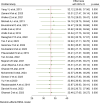Global prevalence and determinant factors of pain, depression, and anxiety among cancer patients: an umbrella review of systematic reviews and meta-analyses
- PMID: 39972435
- PMCID: PMC11841195
- DOI: 10.1186/s12888-025-06599-5
Global prevalence and determinant factors of pain, depression, and anxiety among cancer patients: an umbrella review of systematic reviews and meta-analyses
Abstract
Introduction: Depression and anxiety are prevalent psychological disorders that significantly affect physical, emotional, and social well-being, reducing quality of life and increasing medical costs. These issues are especially challenging for cancer survivors, complicating treatment management, affecting adherence, and potentially impacting survival rates. Thus, this umbrella review aimed to evaluate the global prevalence of pain, depression, and anxiety, as well as their determinants among cancer patients.
Method: An exhaustive umbrella review was conducted to systematically assess the prevalence and determinants of pain, depression, and anxiety among cancer survivors worldwide by analyzing systematic reviews and meta-analyses. The review involved a thorough search of multiple databases and included studies published in English up to July 2024 that reported on these symptoms. The process involved screening and selecting studies based on specific criteria, assessing the risk of bias using the AMSTAR tool, and analyzing data with statistical methods to determine overall prevalence and identify predictors. This comprehensive approach aimed to provide a detailed understanding of these psychological issues in cancer survivors and guide future research and interventions.
Result: The global summary prevalence of depression among cancer survivors was 33.16% (95% CI 27.59-38.74), while anxiety had a prevalence of 30.55% (95% CI 24.04-37.06). Pain prevalence after treatment was 39.77% (95% CI 31.84-47.70). Before treatment, 65.22% (95% CI 62.86-67.57) of cancer patients reported pain, which persisted in 51.34% (95% CI 40.01-62.67) during treatment. The analysis also found that during the COVID-19 pandemic, depression and anxiety rates among cancer patients were at their highest, with prevalences of 43.25% (95% CI 41.25-45.26) and 52.93% (95% CI 50.91-54.96), respectively.
Conclusion: The umbrella review found that depression and anxiety prevalence among cancer survivors was 33.16% and 30.55%, respectively, with significantly higher rates during COVID-19 at 43.25% and 52.93%. Key factors contributing to depression included poor social support, advanced cancer stage, and inadequate sleep, while anxiety was significantly linked to advanced cancer stage and poor sleep quality.
Clinical trial number: Not applicable.
Keywords: Anxiety; Cancer; Cancer survivors; Depression; Meta-analysis; Oncology; Pain; Systematic review; Umbrella review.
© 2025. The Author(s).
Conflict of interest statement
Declarations. Ethics approval and consent to participate: Not applicable. Consent for publication: Not applicable. Competing interests: The authors declare no competing interests.
Figures









Similar articles
-
Stress, anxiety, depression and sleep disturbance among healthcare professional during the COVID-19 pandemic: An umbrella review of 72 meta-analyses.PLoS One. 2024 May 9;19(5):e0302597. doi: 10.1371/journal.pone.0302597. eCollection 2024. PLoS One. 2024. PMID: 38722888 Free PMC article.
-
Impact of the COVID-19 pandemic on the mental health of hospital staff: An umbrella review of 44 meta-analyses.Int J Nurs Stud. 2022 Jul;131:104272. doi: 10.1016/j.ijnurstu.2022.104272. Epub 2022 Apr 27. Int J Nurs Stud. 2022. PMID: 35576637 Free PMC article.
-
The prevalence of anxiety and depression among healthcare workers during the COVID-19 pandemic: An umbrella review of meta-analyses.Prog Neuropsychopharmacol Biol Psychiatry. 2021 Apr 20;107:110247. doi: 10.1016/j.pnpbp.2021.110247. Epub 2021 Jan 19. Prog Neuropsychopharmacol Biol Psychiatry. 2021. PMID: 33476692 Free PMC article.
-
Global prevalence of perinatal depression and anxiety during the COVID-19 pandemic: An umbrella review and meta-analytic synthesis.Acta Obstet Gynecol Scand. 2024 Feb;103(2):210-224. doi: 10.1111/aogs.14740. Epub 2023 Dec 19. Acta Obstet Gynecol Scand. 2024. PMID: 38113292 Free PMC article.
-
Prevalence of anxiety, depression, stress and insomnia among healthcare professionals during COVID-19 in Africa: umbrella review of existing meta-analyses.PeerJ. 2024 Oct 30;12:e18108. doi: 10.7717/peerj.18108. eCollection 2024. PeerJ. 2024. PMID: 39494279 Free PMC article.
Cited by
-
Challenges of cancer survivorship care in Chile: a longitudinal study comparing the quality of care and quality of life for cancer survivors in a primary care network and a cancer centre in Chile.BMJ Open. 2025 Aug 10;15(8):e097015. doi: 10.1136/bmjopen-2024-097015. BMJ Open. 2025. PMID: 40784763 Free PMC article.
-
The unseen struggle-depression and associated factors in geriatric cancer patients.Front Med (Lausanne). 2025 Jul 24;12:1603515. doi: 10.3389/fmed.2025.1603515. eCollection 2025. Front Med (Lausanne). 2025. PMID: 40776912 Free PMC article.
-
The Case for Integration of Health Coaching within Integrative Oncology - Needs, Outcomes, Models, and Standards.Curr Oncol Rep. 2025 Aug 8. doi: 10.1007/s11912-025-01702-1. Online ahead of print. Curr Oncol Rep. 2025. PMID: 40775185 Review.
-
Effects of Gratitude Journaling on Patients with Breast Cancer: A Randomized Controlled Trial.Curr Oncol. 2025 Jul 12;32(7):400. doi: 10.3390/curroncol32070400. Curr Oncol. 2025. PMID: 40710210 Free PMC article. Clinical Trial.
References
-
- Greco MT, Corli O, Montanari M, Deandrea S, Zagonel V, Apolone G. Epidemiology and pattern of care of breakthrough cancer pain in a longitudinal sample of cancer patients: results from the Cancer Pain Outcome Research Study Group. Clin J Pain. 2014;30(3):221–8. - PubMed
-
- Breivik H, Cherny N, Collett B, de Conno F, Filbet M, Foubert AJ, Sjölund K. Cancer-related pain: a pan-european survey of prevalence, treatment, and patient attitudes. Ann Oncol. 2009;20(8):1420–33. - PubMed
Publication types
MeSH terms
LinkOut - more resources
Full Text Sources
Medical

